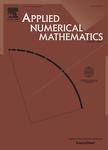版权所有:内蒙古大学图书馆 技术提供:维普资讯• 智图
内蒙古自治区呼和浩特市赛罕区大学西街235号 邮编: 010021

作者机构:Florida State Univ Dept Math Tallahassee FL 32306 USA Ajou Univ Dept AI & Data Sci Suwon 16499 South Korea SUNY Buffalo Dept Math Buffalo NY 14260 USA
出 版 物:《APPLIED NUMERICAL MATHEMATICS》 (应用数值数学)
年 卷 期:2020年第153卷
页 面:35-51页
核心收录:
学科分类:07[理学] 070104[理学-应用数学] 0701[理学-数学]
基 金:Samsung Science & Technology Foundation [SSTF-BA1802-02] Ajou University Science and Technology Bureau of Fujian Province [2017J05010]
主 题:Fractional derivatives Riemann-Liouville derivative Grunwald-Letnikov derivative Caputo derivative Finite difference approximation Discontinuous problems
摘 要:Fractional differential equations have become an important modeling technique in describing various natural phenomena. A variety of numerical methods for solving fractional differential equations has been developed over the last decades. Among them, finite difference methods are most popular owing to relative easiness for implementation. In this paper, we show that the finite difference method with the Riemann-Liouville (RL) fractional derivative yields inconsistent and oscillatory numerical solutions to fractional differential equations of discontinuous problems for the fractional order alpha, 0 infinity and the method is consistent for smooth problems, the numerical solution can be oscillatory for any value of N. To illustrate the inconsistency and the oscillation phenomenon with the RL method, we also consider the finite difference methods with the Caputo and Grunwald-Letnikov fractional derivatives and compare the results with by with the RL method. We also show that the integral approach for the RL method can resolve the issues of the inconsistency and the oscillation phenomenon. Numerical results are presented to support the statements. (C) 2020 IMACS. Published by Elsevier B.V. All rights reserved.